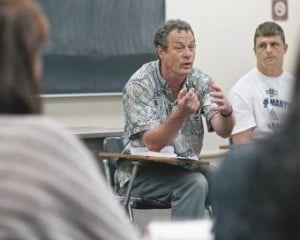In each field of research, there are those scrupulous academic wonders who know their subject down to the tiniest detail. For the study of life writing, Craig Howes is the one to talk to. The director of the Centre for Biographical Research in Hawai‘i discusses developments in Life Writing, constructing identity through Facebook, and the huge surge in interest in writing down one’s own life story.
Hawai‘i as the centre
A green button appears on my screen; Mister Howes is calling in from Honolulu, Hawai‘i. He opens the Skype conversation, enables the camera, and pops up dressed in a casual Hawaiian shirt.
Bringing international relevance to a research centre in Honolulu could have been a challenge, as Mister Howes well knows: ‘When we started out in the mid-eighties, the idea that Hawai‘i could be the centre of anything was ridiculous. But what transformed that was the internet. Now we are in touch with the international academic community throughout the day. Late in the evening we have Skype contact with our European colleagues, and early in the morning things are already happening on the East Coast.’
Although the centre is internationally oriented, Mister Howes explains that the scope of the centre is focused geographically as well. ‘We speak of it as a three-legged stool. Apart from being a major centre for the encouragement of life writing research internationally, it is also responsible for preserving a regional profile–documenting and researching Hawaiian histories–and offering courses in life writing and studying documents of life writing at the University of Hawai‘i.’
From Rousseau to your neighbour
According to Mister Howes, there’s been a huge surge in interest in his field over the past decades. ‘Before the eighties, the study of life writing was restricted to the tradition of viewing autobiographies and biographies as literary texts. The works of interest were biographies of great individuals, diaries of the famous and notable, like that of Rousseau. Very Euro-centric indeed, and quite conservative. The approach focused mainly on style, form, voice. Little emphasis was placed on what we could learn about their time.’
This changed in the mid eighties. ‘In the United States and Britain, there arose a stronger interest in life narratives by ‘ordinary’ people. The other 80% of society became important, including women, people of colour, the poor, etc. And with the subject, the focus changed, as the researchers were now interested in the way these people constructed identities. Re-establishment of identity through narrative became highly important in countries that were decolonizing, especially. This also affected regions that were changing their national identities after repression by totalitarian regimes–regions like Eastern Europe, Estonia and Latvia. They were recapturing the individual voices that were silenced or repressed by the Soviets.’
A shared humanity
Howes’s own concern in the research of life writing bears resemblance to this interest in the ordinary man. ‘Life writing gives you the opportunity to–to some extent–experience and understand the life of others. My own most extended work was on the United States prisoners of the Vietnam war. I analysed what happened with them when they returned home and how they dealt with it.’
‘Life writing has to do with humanism in general. It’s learning about the conditions people lived in, their history, and how they constructed their lives. It has not only an aesthetic appeal, by means of writing a compelling narrative, but there’s a very strong appeal to truth. Through analysing life stories we can build a shared understanding of the world and a shared humanity.’
Selfies, Facebook and blogging
Despite the notion of the ivory tower-academic, Mister Howes and his colleagues aim especially at connecting with the outside world, and anticipating trends visible in everyday life. ‘Life writing is such a powerful force outside the academic world. Reality TV, biopics, they’re amongst the most popular cultural expressions. And take a look at the nominations for the Academy Awards, you’ll see that there’s a huge interest in life stories.’ 
Another trend that Howes has identified is the interest people have in their own life stories. ‘There’s an incredible influx of people who feel the need to make sense of their life’s narrative or their family’s. It’s used therapeutically. People want to organize and preserve their history, trying to make sense of their own experience and background.’
Howes argues that the possibilities to document your life nowadays are endless. ‘Take selfies and Facebook, for example. Young people are creating new identities every day. They experiment with role playing and constructing different identities. But they’re very self-conscious about it. There doesn’t necessarily have to be consistency between virtual and actual life stories.’
My last question, did he ever document his own life, is answered in the negative. ‘Although my life evolves around writing and researching life stories of others, I’ve never really written a diary myself.’ Seems like a reasonable next project?
____________________
By Anne Brugts, content manager
About us: Story Terrace helps customers to capture personal stories in beautiful books alongside a professional writer. Our writers have a range of backgrounds and interests, sharing one passion: Portraying individuals through carefully crafted anecdotes and lively stories.
For more information on having your stories written down, send an e-mail to info@ or get in touch via our contact form.




